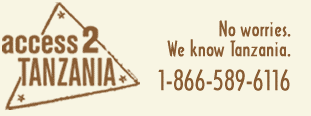Travel FAQs
Travel Tips FAQs

Plug Adaptor (front)
|

Plug adaptor (back)
|
Exchanging Money: The best exchange rate is obtained at banks in the cities (Arusha, Dar es Salaam and Zanzibar) and at the international airports. Hotels will exchange currency for you, but these are rarely the best rates. Do NOT exchange on the street. Just find a bank or ATM (your guide can advise you) and most will have a similar rate. Do be conscious of your surroundings when changing the money and when leaving the bank. The best rate is for new-version (2006 or newer) $100 USD bills. Bills smaller than $50 USD get a worse rate and older bills (2006 or older) will generally NOT be accepted. We recommend using Tanzanian money for the smaller tips like a porter or waiter, but USD for your safari guide.
We are often asked, "what books should I read before my safari?" Following are just some ideas compiled by our staff and also gleaned from traveler forum discussions:
A2T reading recommendations:- Barefoot over the Serengeti by David Read. He is American but due to missionary parents spent much of his childhood playing with Masai children and learned the language. It’s quite insightful.
- A Primate’s Memoir by Robert Sapolsky. A hilarious book that can also give some perspective to East Africa.
- Born a Crime by Trevor Noah. It’s about South Africa, but a very easy and fun read.
- The Boy Who Harnessed the Wind by William Kamkwamba. It’s set in Malawi but much of what I read reminded me of Tanzania.
- Africa’s Child by Maria Nhambu (first book in triogy). It’s available on Amazon. I know the author and at least one other person in her autobiography. It’s definitely not all about Tanzania, but she was raised there as an orphan (she’s mixed race) and had a most amazing life. In all, the books are quite good and provide some good and important perspectives.
- Among the Elephants by Iain Douglas-Hamilton. Recommended by others here. It can be hard to find (at least in Canada) as it is out of print - about researching elephants in Manyara in the 1970's. I enjoyed the story, and had hope of experiencing some of it when visiting the Park, but the ellies hid until we had to leave the park. After all the efforts to find and order the book, I will admit that I left it in Moshi as 'not a keeper'.
- Born Wild by Tony Fitzjohn for some inside track on TANAPA.
- Love, Life, and Elephants: An African Love Story by Dame Daphne Sheldrick. This autobiography is about her work with orphaned Elephants in Kenya among other things.
- Sand Rivers by Peter Matthiessen. Focusing on a 1979 safari into the Selous Game Reserve in southern Tanzania, the expert text and revealing photographs portray the people, the land, and the numerous wild animals of one of the world's last great wilderness areas.
- A guide to the birds of East Africa by Nic Drayson. A change of pace and a lovely book and not what you think from the title.
- Serengeti Home by Kay Turner. You will learn much of the early days of Game Wardens in Tanzania.
- Serengeti Shall Not Die by Bernhard Grzimek. A must read.
- Speak Swahili Damn It by James Penhaligon.
- Beyond the Kopjes by Midge Raymond.
- The Peace Corpse: Misadventures in Love and Africa by Andy Christofferson. The story of a young Peace Corps member in Tanzania - a bit roughly written but fun.
- Do Not Take this Road to El-Karama by Chris Harvie. A South African man takes a road trip around Africa- interesting take on the differences between the people of different countries.
- Hamna Kabisa - The TAnzanian Joke by Stuart Chambers.
- My Kenya Days by Wilfred Thesiger
- The White Massai by Corinne Hofmann
Safari Tips
Not obligatory, but a tip for exceptional service would be appreciated. Here are some general ranges of tipping per person per day / per vehicle- Number of people in a vehicle / Tipping guideline
- 6 people / $10 to $15 per person per day
- 4 people / $12 to $20 per person per day
- 2 people / $15 to $25 per person per day
Kilimanjaro Tips
- Tipping recommendations from the trekking group (not per climber):
- Guides: $15/day
- Assistant Guides: $10/day
- Cook: $10/day
- Porter: $5/day
- Expect 1 guide per 2 hikers, 1 assistant guide per 3 hikers, and 1 cook per 8 hikers. Porters as follows:
- 2 porters per hiker on the 5-day Marangu Route and Mt. Meru (minimum of 4 porters)
- 3 porters per hiker on a 6 or 7-day trek (minimum of 5 porters)
- 4 porters per hiker on the 8-day Lemosho Route (minimum of 8 porters)
- Sometimes extra porters are required based on the weight of the luggage.
- Budget $200-250 per hiker for tips for a 6-day trek.
- small denominations of Tanzanian shillings (or US dollars); tipping in shillings is preferred
- rubber bands (or envelopes)
- small notebook and pen
- calculator and the current exchange rate; Tsh to dollars and dollars to Tsh (i.e. if 1.00US$ = 2,300tsh then 1,000tsh = 0.43US$ approx)
There are strong social obligations in Tanzania that are opposite to the independence prized in many Western countries. Greetings are very important, and spending time socializing is also valued in Tanzania. Tanzanians are generally very accommodating and helpful to outsiders. Your friends, local family, and local co-workers will often accompany you and want to help you in any way possible. As a guest, some people may want to serve you. Be aware that this may make you feel uncomfortable, but their goal is to make you as comfortable as possible.
Tanzanians are incredibly friendly and welcoming people and do not be surprised to get invited frequently to peoples’ homes for “chai” (tea). They will offer you drinks or food. You may be considered rude if you refuse but of course do not consume things you are uncomfortable with. Also understand that it is generally culturally unacceptable to refuse a gift. Whoever invites people for drinks or a meal generally pays for everything instead of splitting the bill. If other people pay for your drinks or meals do not be surprised.
There is a community concept in Tanzania that people who have something should share it with their friends and family, and that property is ours rather than mine or yours. This is in sharp contrast to Western values of me and mine. Be prepared that people will ask you to give them things, pay for things, or buy things. Western people often interpret this as people trying to take advantage of them. There is simply a cultural difference of sharing whatever you have coupled with an assumption that you have a lot to give. This is opposite to Western culture where we value independence and often do not like to ask for help or things especially from others. It is best to say “no” if that is how you feel. Realize, too, that Tanzanians often say “no” to each other as well. When they ask for something, such as for help sending them to school, your camera, or for you to buy something from them, they are not really expecting you to say “yes,” they are just trying their chances. Feel free to say “no” without an explanation. A simple, “Siwezi” (I can’t) or “Sina” (I don’t have any) if someone asks you for something you are uncomfortable giving, or “Asante” (Thank you) while shaking your head and smiling if someone asks you to buy something you don’t want, is a culturally appropriate response. As a result of poverty, many people do genuinely need help, but you should talk with your guide before providing assistance to someone. It is your choice to help an individual, but keep in mind it can create jealousies and set precedents for future expectations. Try to be sensitive to the economic disparities and try to keep symbols of wealth such as cameras, jewelry, or large amounts of local currency out of public view.
